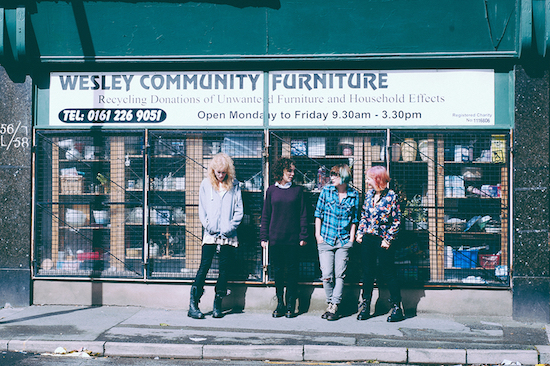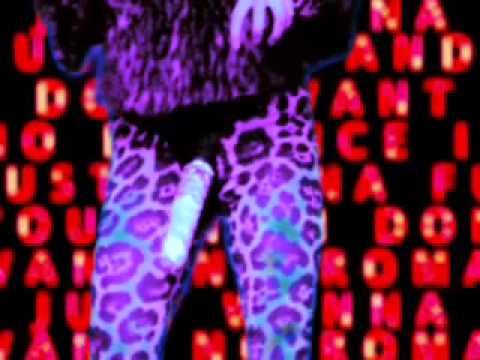Photograph courtesy of Elinor Jones
There is an intoxicating energy about Manchester band ILL. On meeting them in an empty city centre bar, first impressions fizz and crackle as much as their riveting post-punk sound pulses with wrath and defiance. The quartet, formed in 2012, are fiercely – and truly – DIY (an oft-misused term in today’s music industry parlance) and their commitment and desire to control all aspects of ILL’s output is as compelling as it is noble.
ILL comprise of Harri Shanahan (vocals and keyboards), Sadie Noble (guitar), Whitney Bluzma (bass) and Fiona Ledgard (drums). Formed in 2012 after their previous band – the "improv collective" Womb – split up, ILL have self-released a single (which contains a mind-blowing reworking of The Stooges’ ‘Cock In My Pocket’, replete with magnificent B-movie-style video) and two EPs.
Their most recent release, last year’s EP The Housewives’ Trilogy, is a three-track romp through the band’s creative range – ‘Secret Life’ contains ominous shades of Big Black, while ‘Diazepam’ sounds like a nightmare-inducing nursery rhyme written for Generation Benzodiazepine. ILL’s live shows used to include saws and vibrators (courtesy of previous band member and conceptual artist, Rosanne Robertson), but now rely on a heady mix of "full-on noise jams" and a constant reworking of a set list buzzing with kinetic force.
Indeed ILL are all about energy. An hour in their presence is a head-rush of ideas, passion and a whiff of mischief. And while the issues they sing about – misogyny, mental health, the Rebel Dyke movement in the 1980s – shape their raison d’être, it is ILL’s exuberant life force that makes them a healthy option for the heart and mind.
Sorry, I cannot resist this question – I believe ILL were birthed from your previous band, Womb?
Fiona Ledgard: Ha. Well, three of us were in Womb. Initially, ILL included Rosanne [Robertson], who now does a lot of experimental sound art. We did a first gig at Gullivers [in Manchester] and it went really well. After that Sadie, who was in another band called Salford Media City, came along and we loved the extra texture of Sadie’s guitar.
What was your initial approach to making music as ILL?
Harri Shanahan: We just jammed together. A couple of songs that we still play came out of those very first jams. We wrote a song called ‘Breasts’, and we wrote a really atmospheric song called ‘Ambulance’. We recorded an instrumental piece called ‘Serotonin’ and ‘The Ill Song’ which we still play. Those first jams were really productive. Womb was great but it was very, very noisy and there were a lot of us. It was quite hard to hear and there was a lot of focus on improvisation. With ILL, there was a huge joy of just writing songs and we loved the smaller set-up where we could all hear each other.
How did you settle on what you wanted the ILL sound to be?
FL: At the start, we liked the idea of sounding like The Fall or Can, and then early post-punk female-fronted bands like LiLiPUT/Kleenex. But, we just really naturally jammed things through.
Whitney Bluzma: We can write a very silly song about pinching granny’s pills or a full-on metal attack. There is no trying to be like, or not to be like, any other band. It’s just whatever everyone is enjoying in the moment. We like a wide range of music and are not particularly obsessed with one genre.
When Rosanne was in the band, she would take to the stage with a variety of objects ranging from a saw to a vibrator. How has your live act changed since she left ILL?
FL: It is still as anarchic on stage, even without Rosanne. Quite often part of the set is completely improvised. Although we don’t have saws, or dildos, on stage anymore we still have that haphazard aspect where the audience isn’t sure what is going to happen next.
HS: It’s exciting on stage and there is a lot of energy which propels us. We do still get rooms full of guys stroking their beards. That can be fun because it is a challenge.
FL: We once played in a really stereotypical Wetherspoons pub in Bury. There was horseracing on the TVs and we were the only females in the building. We played to a load of men with their arms folded. We went into a full-on noise jam and the men were like, ‘What the fuck is this?’ and there was one man at the bar with tissues stuck in his ears. By the end, we had some of them dancing.
I read that your video for the track ‘Cock In My Pocket’ cost you £10 to make. I’m intrigued as to what you spent the money on.
HS: I had to buy a fake cigar, a fake beard, some talcum powder, a pair of leopard print leggings and we needed some biscuits.
Biscuits? That sounds a bit decadent. Were they integral to the video?
HS: Biscuits are an absolutely integral part of film-making. You cannot make a film without biscuits. I loved making that video. I know it looks really lo-fi, but it was huge fun.
Your most recent release was The Housewives’ Trilogy. Can you tell me about the concepts behind the songs on that EP?
WB: The first song is about marriage and being forced into thinking that’s the only thing that matters – from the female perspective. The song ‘Secret Life’ is a true story about a client I had – I also work as an interpreter – who found out that her boyfriend had disappeared with all her belongings and hadn’t been paying any rent for months. So it’s a song about the anger associated with finding out someone has been lying to you. ‘Diazepam’ is of course the housewife’s little helper.
HS: The song is tongue-in-cheek as you are not really happy while on diazepam. I have a huge issue with mental health and the way people are treated. I do think everyone, but women in particular, get over-medicated – it’s almost, ‘Calm down dear and take these pills’. That’s why we wrote ‘The Ill Song’ with the line, "Take your pills, take your pills", because I was so frustrated at being passed from pillar to post. So, even our funny songs can have a dark undertone. It’s an opportunity to vent. I dedicated ‘Diazepam’ to my psychiatrist. Sometimes the best thing you can do when people are shitting on you is to take the piss out of them. There is a lot of shit and piss in that sentence.
You are very much a DIY band. While I see the huge advantages of having complete artistic control, you also must be constrained by resources and financial restrictions. Does being a DIY band in any way compromise what ILL are aspiring to be?
FL: At the moment, the sound we are aspiring to is the sound we are already beginning to make. We are not missing out on certain textures because of a lack of resources. Having said that, we wouldn’t rule out playing with the Philharmonic Orchestra if they want us to.
HS: Fiona can play drums on a shit kit, as well as a great kit. A good musician can make that happen. There are some people who have more money than ability and I would modestly say that we are the other way around. If you are intelligent, creative and resourceful and you have a little bit of time and a lot of energy you can do whatever you want and money should not be an issue. Also, it is so nice to make things with your hands and your ears. That’s what we want to do. And what would someone else do? Put a load of make-up on us and blow a fan in our direction. That would be shit. I’d end up looking like a baby in a gale. We don’t want someone trying to make us marketable.
A number of your songs tackle the issue of misogyny and everyday sexism. I saw a quote from you that a male sound engineer once asked you whether you knew what a decibel was. How do you deal with such idiocy?
FL: We laugh at it but it makes us angry as well. At one of our early gigs the promoter asked if we were all sleeping with each other. Also, some men out there seem to genuinely be in a state of disbelief that women can actually make music – and that we can play and appreciate music as much as men do. It is upsetting, but it is worth adding that there are loads of supportive men here. The Manchester music scene is really, really cool and there are loads of male bands who really get what we are about.
HS: It’s not even just men. Women internalise the misogyny they hear – it’s very pervasive and very pernicious and it is probably outside the scope of this interview. Some people will come and talk to us about how we looked great on stage, but we want them to have listened to the music. It’s why we so fiercely want to be in control of our image. If you struggle all the time to be heard and to get your point across, against a backdrop of casual everyday sexism, it results in you not wanting anyone telling you what to do.
So what are you going to be doing next?
FL: We are going to be working on our ILL-bum, which we will record ourselves.
And what will your ILL-bum be like?
HS: It will be evil pop music.
That’s the best kind of pop music. Harri, can I ask you about the video documentary you have been commissioned to make? I believe it is about the 1980s Rebel Dyke movement.
HS: It’s outside the band. It is a documentary about a group of women who were lesbian squatters in London in 1980s. They were anarchist punks. They were sex workers. They were in punk bands. They set up the first women-only sex club in London. They were the Rebel Dykes – the people who were really inclusive and sex positive and just kick-ass human beings. I have met some of them and they are in their 50s and 60s now – they are wonderful women. We are just going to try and tell their story. I just feel very connected to those people – I think they were the beginnings of the queer movement. They feel like cultural ancestors.
That sounds very connected to what ILL is about.
HS: It is very much the same – punky, DIY and anti-establishment. There is a healthy slice of fuck off. It’s about passionately being yourself.
The Housewives’ Trilogy is available now from ILL’s Bandcamp. The band play The Star & Garter in Manchester on May 2 as part of John Doran’s An English Trip book tour, where the tQ editor will be performing with Årabrot, 2KoiKarp and Jay Tea, with fellow support coming from Ten Mouth Electron; head to the Facebook event for full details



